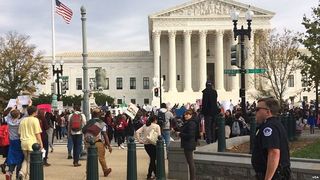Stress
How a Political News Buff Sought Peace by Going Cold Turkey
When I peeked, the UCLA report on incivility in high schools distressed me.
Posted October 27, 2017

During a moment of serendipity, after a dinner event, I met the author of The Spirituality of Age. At that time Robert L. Weber, Ph.D., gave me a copy of his book. Initially I thought to myself, “Am I really looking older?” For me and many of my academic colleagues, the nightly news and name-calling from the White House seemed to be aging us. So I tried seeking peace by avoiding local and national news. I even gave up checking headlines on my iPhone every 10 minutes.
My inspiration for this cold turkey news blackout came from a section within Weber's book called, “Can withdrawal from the mainstream, by choice or circumstances, have value? ” Although the full title of the book is The Spirituality of Age: A Seeker’s Guide to Growing Older, after reading that section I decided that the subtitle could easily have been “A Guide to Growing Wiser at Any Age.” And yes, it was valuable to take this retreat from noise and news.
However, despite my best effort at my news fast, even abandoning Rachel Maddow, I was not able to give up Twitter. And today I peeked at the news. A multitude of media outlets on carried the UCLA report that anger is escalating in the high schools.They pointed a finger at Trump. My peace was shattered. The report from John Rogers UCLA’s Institute for Democracy, Education, and Access is titled: Teaching and Learning in the Age of Trump: Increasing Stress and Hostility in America’s High Schools.
The Executive Summary states:
"This report examines whether the substance and tone of national political discourse during the first four months of the Trump administration affected U.S. public high school students. Throughout his campaign and in his presidency to date, Donald Trump has addressed a number of 'hot-button' topics that call into question the status or rights of many different groups in American society. The charged political rhetoric surrounding these and other issues often has been polarizing and contentious."
In this brief sample from the executive summary, the researchers noted:
- Stress and welfare concerns have increased: 51.4% of teachers reported more students experiencing “high levels of stress and anxiety” than in previous years.
- Well-being: 79% of teachers reported that students are concerned about their families, essentially due to talk on immigration, travel limitations on predominantly Muslim countries, restrictions on LGBTQ rights, changes to health care, or threats to the environment.
- Polarization: More than 20% of teachers reported heightened polarization and incivility.
- Unfounded claims: 41.0% of teachers reported an increase in the introduction of unfounded claims from unreliable sources.
- Derogatory remarks: 27.7% of teachers reported this increase even during class discussions.
Civility, a possible solution. Of the 1,535 responding teachers, who had received a $10 Amazon gift card to participate, 91.6% agreed that: “national, state, and local leaders should encourage and model civil exchange and greater understanding across lines of difference.” Almost as many (83.9%) agreed that national and state leaders should “work to alleviate the underlying factors that create stress and anxiety for young people and their families. This small report tossed me into stress mode, although, despite the findings the methodology might be refuted: Teaching and Learning in the Age of Trump: Increasing Stress and Hostility in America’s High Schools.

How did I regain my peace of mind? I went back to Weber’s book, co-authored with Carol Orsborn, Ph.D. The format is one in which questions are answered by each of them in back-to-back fashion.
In addressing the question: "Can withdrawal from the mainstream, by choice or circumstances, have value?" Orsborn pointed out:
"Thomas Merton devoted much of his adult life to answering this question. While Merton himself was torn between his own passion for contemplative living and the growing demands upon him through the enthusiastic response with which his writing was met, he was clear about the value of withdrawing.”
Indeed, Merton himself addresses this in a book edited by Mary Tardiff, OP, At Home in the World: The Letters of Thomas Merton and Rosemary Radford Ruether. He took the side of wilderness, while she argued against taking off to the hills:
“Paradise is brought out of the wilderness, not in a symbolic sense of planting trees in the wilderness, but in the real sense of struggling against the dehumanizing forces in the city of man.”
Yes, this book is about aging, but it is also about wisdom. And one does not need to wait until the golden years to seek practical applications for finding peace in a troubled world. What about today's teenagers? If only a hero with compassion, ethics, and values would rise up and give students a role model whom they might emulate.
Copyright 2017 Rita Watson




